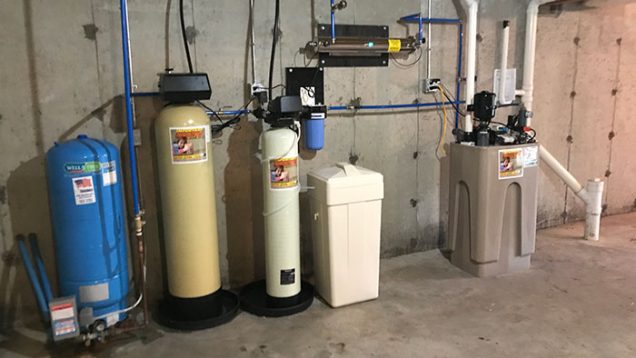When we think of freshwater, we tend to think of surface waters such as rivers, lakes, marshes, swamps, ponds, and other wetlands. It makes sense that this is the most familiar sort of water (along with, of course, the vast saltwater of the ocean), as it’s the kind we see regularly. However, it’s only a small portion of the Earth’s freshwater, the bulk of which exists out of sight and below the surface. This underground water supply is commonly known as groundwater.
Let’s take a look at the basic differences between groundwater and surface water, and how Greco & Haines can help you improve the quality of your home’s water supply.
Groundwater vs. Surface Water
Surface water includes the freshwater that is channeled into stream systems, lakes, and wetlands on land. Groundwater, on the other hand, is contained in subterranean aquifers within the rock layers below the water table – the underground boundary that divides the saturated and unsaturated levels of the ground. Groundwater derives primarily from rainfall and snowmelt that infiltrates through the soil and into the bedrock, where, driven by gravity, it collects between particles, fractures, and cavities inside rock layers.
The majority of the Earth’s groundwater lies within a half-mile of the surface. When it hits an impermeable subterranean layer – such as massive, nonporous rock or clay – the groundwater pools and may flow laterally along it.
While groundwater might remain ensconced in aquifers for thousands of years, it can also naturally appear at the surface in the form of springs, seeps, and groundwater-fed lakes. This is due to its movement within sedimentary strata or along impervious geologic layers.
While surface waters are widely used all over the world for human needs, groundwater aquifers supply most of the drinking water in the United States. When you use a well system, you are tapping the groundwater supply on your property.
Surface Water vs. Groundwater Quality
Through runoff, air fallout, and other sources, surface water can contain significant amounts of contaminants such as chemical pollutants. And because groundwater is connected to surface water systems through soil percolation and seepage, it is also susceptible to contamination. However, the rock and sediment layers below the water table act as natural filters. Therefore, groundwater generally contains fewer contaminants than surface water and requires less treatment.
Minerals in Water – Groundwater & Hardness
While groundwater typically contains fewer contaminants than your average surface water, it does tend to have higher mineral content due to the dissolving action of water. In fact, water is often referred to as the “universal solvent” because it dissolves more substances than any other liquid. Mineral content is the measure by which we classify water as “hard” or “soft.” Hard water contains large amounts of certain ions (primarily calcium and magnesium) while soft water has a lower mineral concentration.
We commonly quantify hardness by measuring the concentration of calcium and magnesium in water and then converting it to the equivalent amount of calcium carbonate, expressing the figure in milligrams per liter (mg/L) of water. The U.S. Geological Survey divides water into four different categories based on mineral content, including:
- Soft Water – Zero to 60 mg/L
- Moderately Hard Water – 61 to 120 mg/L
- Hard Water – 121 to 180 mg/L
- Very Hard Water – 180 or more mg/L
Another way to represent hardness that is often used in the water treatment industry is by grains per gallon (gpg) of calcium and magnesium. Using this measure, the Water Quality Association defines the following hardness levels:
- Soft Water – Zero to 1.0 gpg
- Slightly Hard – 1.1 to 3.5 gpg
- Moderately Hard – 3.6 to 7.0 gpg
- Hard – 7.1 to 10.5 gpg
- Extremely Hard – 10.6 or more gpg
Hard water is often undesirable to homeowners because it can leave deposits like limescale that can clog showerheads, faucets, and plumbing fixtures. Additionally, it’s more difficult to work up a soap lather if your water supply is too hard.
How to Get Rid of Hard Water – Water Softener System Installation in CT
Greco & Haines can help you gauge the relative hardness or softness of your well water. Among our wide array of well water testing services, we offer free analyses of mineral content as well as more focused sampling for chemical and bacterial contaminants. By taking advantage of our free evaluations, you can determine whether a hard water softener is necessary for your domestic well water supply.
Greco & Haines water filtration systems include multi-media setups that incorporate softeners for mitigating the effects of naturally hard water. With a whole-house water softener, you can say goodbye to frustrating and potentially expensive hard-water-related issues such as bathtub rings, clogged fixtures, and poor suds development.
Private well water service in Easton, Wilton, Old Lyme, Southbury and all over Connecticut.
Are you struggling with the annoyances of hard water? Unsure if your well system can benefit from a hard water softener? No matter what well-related issue you’re currently facing, Greco & Haines can help.
Our expert team is dedicated to helping you keep your home’s drinking water safe and clean for your family to enjoy. Plus, we offer service 365 days a year – with no extra charge for weekends and holidays! For more information about our well water testing services in CT, contact us today via our online contact form or call anytime: 203-735-9308 or 203-777-2256 or from any CT area code 1-800-922-2958.

